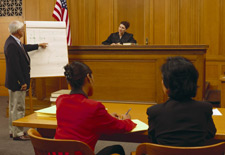- 01: Introduction
- 02: History
- 03: Propellants, Firearms, and Ammunition Development
- 04: Modern Firearms Manufacture
- 05: Small Arms Ammunition
- 06: Evidence Handling Procedures
- 07: Equipment and Instrumentation
- 08: Examination of Firearms
- 09: Cartridge and Shotshell Examination
- 10: Characterization and Evaluation of Fired Projectiles
- 11: Bullet Comparison and Identification
- 12: Gunshot Residue and Distance Determination
- 13: Toolmark Identification
- 14: Communicating Results
- Resources


Courtroom Testimony
Home > Communicating Results > Courtroom Testimony

All forensic sciences today are rigorously tested and documented. When scientific information is presented in court, judges, attorneys, and examiners alike struggle to understand or effectively present the technology. Prosecutors and defense attorneys with large caseloads and severe time constraints wrestle to comprehend even the basic concepts. Prosecution and defense bars spend countless dollars attending training seminars on “how to handle” technical evidence.
Effective courtroom testimony is a critical component of the examiner’s duties. The ability to effectively communicate an understanding of the science, technology, and test analyses involved with a particular case to non-scientists is essential. Maintaining objectivity, professionalism, and scientific integrity is absolutely necessary and will avoid many of the pitfalls that examiners may otherwise face.
| Important Notice: |
| The laws, rules of evidence, and rules of procedure may vary from court to court and state to state. The examiner should always check with an attorney (normally the prosecuting attorney) before giving testimony to be aware of the particular law and rules applicable in the jurisdiction. The content of this module is not intended, nor should it be construed, as legal advice. |




